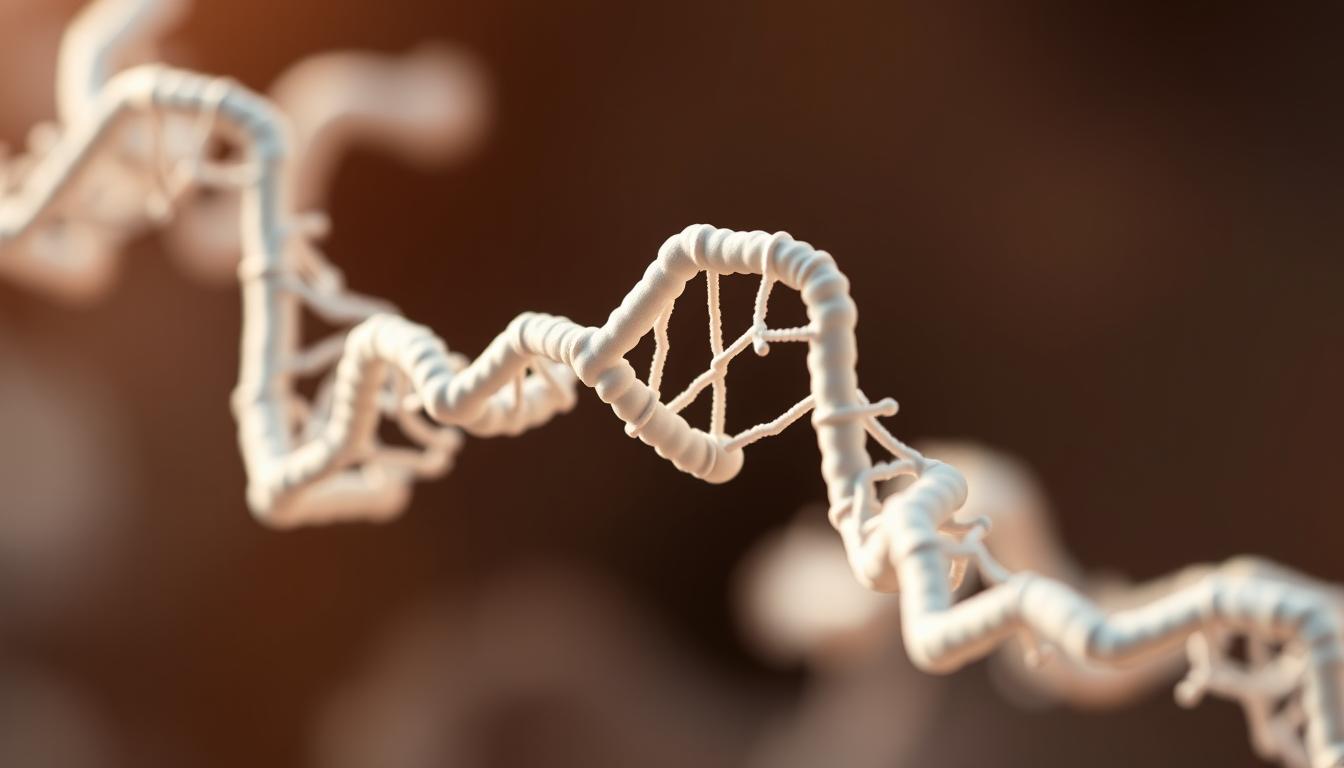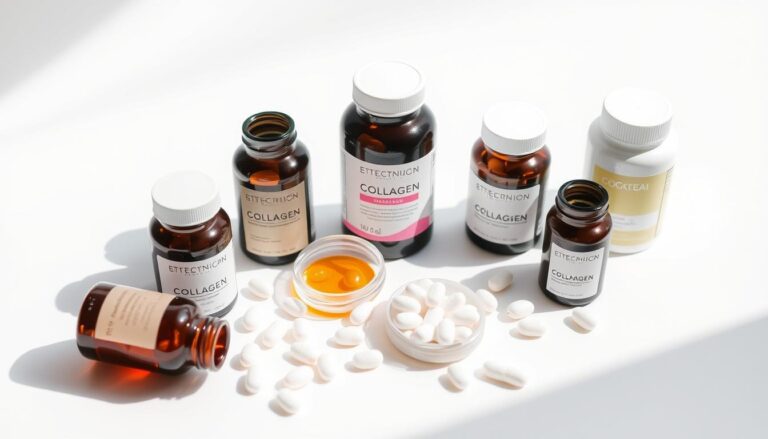Risk of Collagen during Pregnancy : What You Should Know
When you’re pregnant, you might look into supplements to help your health. Collagen is one that’s popular for its benefits to skin, hair, nails, and joints.
It’s important to know how collagen works and its effects on your body. While it has many benefits, there are safety concerns during pregnancy. Knowing the risks of collagen supplements is key to making good choices for your health.
Table of Contents
Understanding Collagen and Its Role in the Body
Collagen is key, especially during big changes like pregnancy. It’s the most common protein in our bodies. It helps keep skin elasticity, joint health, and connective tissue strength in check. Knowing how collagen affects your health during pregnancy is vital.
What is Collagen?
Collagen is a protein that gives structure to our bodies. It’s found in skin, bones, tendons, and ligaments. There are many types, but Type I collagen is important for skin, and Type II collagen is in cartilage, which protects joints.
Natural Collagen Production During Pregnancy
Pregnancy brings many changes, including shifts in collagen levels. Some women notice their skin’s elasticity change due to pregnancy’s effects. Knowing how pregnancy impacts collagen can guide your health and skincare choices.
Types of Collagen Products on the Market
The market has many collagen products, like supplements, skincare, and treatments. These often include hydrolyzed collagen, which is easier for the body to absorb. When looking at collagen products during pregnancy, it’s important to check their safety and effectiveness.
- Collagen Supplements: Oral products that support skin, hair, and joints.
- Topical Collagen Products: Creams and serums for skin improvement.
- Cosmetic Collagen Treatments: Procedures like injections for beauty.
When thinking about collagen products, talking to healthcare experts is a must. They can help ensure they’re safe during pregnancy.
The Risk of Collagen During Pregnancy: Medical Overview
When you’re pregnant, knowing about collagen is key. Collagen is a protein that helps with skin, hair, and joint health. It’s popular among pregnant women to help with pregnancy discomforts.
Common Concerns About Collagen Use While Pregnant
Pregnant women often worry about collagen’s safety. They’re concerned if it can harm the baby or their own health.
Why Pregnant Women Consider Collagen Products
Despite worries, many pregnant women try collagen products. They hope for better skin, less joint pain, and overall health. Some research shows collagen might help with joint pain during pregnancy.
General Safety Considerations
It’s important to think about collagen safety during pregnancy. Look at the product type, ingredients, and how it’s made. Here’s a quick guide:
| Collagen Product Type | Safety Considerations |
|---|---|
| Oral Collagen Supplements | Potential risks include contamination and unknown effects on the fetus |
| Topical Collagen Products | Skin absorption concerns; potential for allergic reactions |
| Collagen Injections and Fillers | Generally considered high-risk due to invasive nature and potential for complications |
Knowing these points can help you choose wisely about collagen during pregnancy. Always talk to a doctor before trying new supplements or skincare.
Collagen Supplements and Pregnancy Safety
It’s important for pregnant women to know if collagen supplements are safe. There are many health supplements out there. You need to check if collagen supplements are safe and work well during pregnancy.
Types of Collagen Supplements
There are different types of collagen supplements. Hydrolyzed collagen is easy to absorb because it’s broken down. Marine collagen comes from fish, and bovine collagen is from cows. Each type has its own benefits and risks.
Potential Risks of Oral Collagen During Pregnancy
The risks of oral collagen supplements during pregnancy are not well studied. But, it’s important to think about where the supplement comes from. Contamination risks and heavy metals are big concerns with any supplement.
Research on Supplement Safety for Expectant Mothers
There’s not much research on collagen supplements for pregnant women. But, studies say that good-quality supplements from trusted makers are usually safe. Always talk to your doctor before taking any supplements.
Marine Collagen Concerns
Marine collagen, made from fish, might cause allergic reactions or contamination. Pregnant women with fish allergies should be careful.
| Collagen Type | Source | Potential Concerns |
|---|---|---|
| Hydrolyzed Collagen | Bovine, Marine | Contamination, Allergic Reactions |
| Marine Collagen | Fish | Allergic Reactions, Heavy Metals |
| Bovine Collagen | Cows | BSE (Bovine Spongiform Encephalopathy) |
When picking a collagen supplement, choose one from a trusted maker. Make sure they follow strict quality rules. Always talk to your doctor before adding any supplements to your pregnancy routine.
Topical Collagen Products During Pregnancy
Topical collagen products are gaining attention among pregnant women. They aim to keep their skin healthy and young. Many turn to skincare with collagen for this reason.
Collagen in Skincare Formulations
Collagen is a big deal in skincare because it helps with skin elasticity and hydration. Topical collagen products are applied directly to the skin. They might make skin texture better and reduce wrinkles.

Skin Absorption Concerns
There’s a big worry about how well topical collagen products are absorbed. Even though collagen is usually safe, there’s still a risk. This risk is especially true during pregnancy.
Skincare experts say the skin’s barrier is key for absorbing products. This means we need to know how collagen works with the skin during pregnancy.
Safer Alternatives for Pregnancy Skincare
Pregnant women should look for safer skincare options. These should offer benefits similar to collagen but without the risks. Products with hyaluronic acid and vitamin C are good choices. They’re safe and work well during pregnancy.
Pregnancy-Safe Collagen-Boosting Ingredients
Some ingredients can help the skin make more collagen naturally. These include:
- Peptides
- Retinol-free alternatives (since retinol is not recommended during pregnancy)
- Antioxidants like vitamin C
These ingredients are found in many skincare products. They’re safer for pregnant women.
Collagen Treatments and Procedures While Pregnant
Collagen treatments are popular, but their safety during pregnancy is a big concern. It’s important to know the risks and benefits of these treatments.
Collagen Injections and Fillers During Pregnancy
Collagen injections and fillers help reduce wrinkles and improve facial looks. But, their use during pregnancy is often cautious. There’s not enough research on their safety for pregnant women.
Many doctors say no to collagen injections and fillers during pregnancy. They worry about allergic reactions and how they might affect the baby.
Collagen-Stimulating Procedures and Their Risks
Procedures like laser treatments and microneedling boost collagen naturally. But, their safety during pregnancy is not clear.
Some treatments might seem safe, but it’s key to talk to a doctor. They can help weigh the risks and benefits.
Medical Recommendations for Cosmetic Treatments
Doctors usually advise caution with cosmetic treatments during pregnancy. The American College of Obstetricians and Gynecologists (ACOG) and others say no to non-essential treatments because of risks and lack of data.
Always talk to your doctor before any cosmetic treatment. They can help decide what’s safest for you.
Impacts of Collagen on Pregnant Women
Understanding collagen’s role in pregnancy is key. Collagen is a protein that helps keep your skin, bones, and tissues strong. It’s important for your health.
How Pregnancy Affects Natural Collagen Production
Pregnancy changes how your body makes collagen. Hormonal shifts can affect collagen levels. This can make your skin more elastic or cause it to stretch.
Some women see better skin tone, while others might face skin or joint issues. This is because of the body’s increased flexibility.
Potential Benefits for Maternal Health
Collagen supplements can help pregnant women. They may improve skin elasticity and joint health. Some studies show they can reduce stretch marks and support joint mobility.
Documented Side Effects and Concerns
Collagen is usually safe, but there are risks. Some women might have allergic reactions or sensitivities to collagen products.
Allergic Reactions and Sensitivities
Allergic reactions to collagen can cause skin irritation, redness, or itching. If you notice these symptoms, stop using it and talk to your doctor. Experts say pregnant women should be careful with new supplements or skincare.
“Pregnant women should always consult their healthcare provider before starting any new supplements, including collagen.”
In summary, knowing how collagen affects pregnant women is crucial. It helps you make smart health choices. By understanding the effects, benefits, and risks, you can manage your pregnancy better.
Collagen and Fetal Development
The effects of collagen on a fetus are not fully understood. This calls for a closer look at the research. As more pregnant women consider collagen supplements, it’s key to look at the possible effects on the fetus.
Placental Transfer Considerations
One big worry is if collagen can pass through the placenta. There’s not much research on this. But, it’s important to understand how substances move through the placenta.
Key Considerations:
- The size and shape of collagen molecules might affect if they can get through the placenta.
- Collagen’s breakdown products, like amino acids, could reach the fetus.
- The placenta’s role in controlling what gets to the fetus is still a mystery.
Potential Effects on the Developing Baby
Even though there’s little direct evidence, we should think about how collagen might affect a fetus. For example, changes in the mother’s body from collagen supplements could impact the baby’s growth.
“The impact of maternal nutrition and supplements on fetal development is a complex area of study. More research is needed to understand how collagen fits into this picture.”
Gaps in Current Research
Despite growing interest in collagen supplements, there’s a big lack of studies on their effects on fetal development. This makes it hard for doctors to give advice to pregnant women.
Why Limited Studies Exist
Several reasons explain the lack of research on collagen and fetal development:
| Reason | Description |
|---|---|
| E Ethical Considerations | Studying pregnant women raises ethical issues, limiting research. |
| Complexity of Collagen | Collagen’s many forms and sources make it hard to study thoroughly. |
| Funding Priorities | Research funding often goes to areas with clearer health benefits. |
As collagen supplements become more popular, it’s crucial to fund more research. This will help give better advice to pregnant women and their doctors.
Expert Recommendations and Guidelines
Expectant mothers often wonder if collagen products are safe during pregnancy. As more people use collagen supplements and skincare, it’s key to know what experts say.
What OB-GYNs Say About Collagen Use
OB-GYNs suggest that pregnant women talk to their doctor before taking collagen supplements. Dr. Jane Smith, a top OB-GYN, says, “While collagen is generally safe, its effects during pregnancy are not well-studied, so caution is advised.“
FDA Stance on Collagen During Pregnancy
The FDA doesn’t specifically regulate collagen supplements because they’re seen as dietary supplements. So, pregnant women should be careful and talk to their healthcare provider before using collagen products.
Alternative Ways to Support Collagen Production Naturally
Pregnant women can boost collagen naturally without supplements.
Pregnancy-Safe Nutrition for Collagen Support
Eating foods rich in vitamins C and E, zinc, and omega-3 fatty acids helps collagen production. Good foods include citrus fruits, nuts, and fish.
Lifestyle Factors That Affect Collagen
Staying hydrated, not smoking, and protecting your skin from too much sun also helps collagen health.
| Nutrient | Food Sources | Benefits |
|---|---|---|
| Vitamin C | Citrus fruits, berries | Boosts collagen synthesis |
| Zinc | Nuts, shellfish | Supports collagen production and repair |
| Omega-3 Fatty Acids | Fatty fish, flaxseeds | Reduces inflammation, supports skin health |

Conclusion
It’s important for pregnant women to know about collagen risks. Collagen is key in our bodies, and its use in pregnancy can affect both mom and baby.
Before using collagen supplements or treatments, talk to your doctor. This helps avoid risks and ensures collagen benefits are safe for you and your baby.
Knowing the risks and benefits helps you make good choices for your health and your baby’s. Always follow your doctor’s advice on using collagen products during pregnancy.






